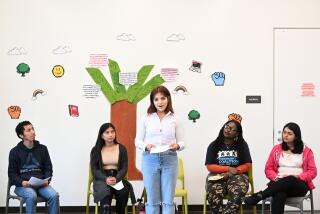Oceanside’s ‘Pen Pal Peace Plan’ : Teen-Agers Extend Olive Branch to Gorbachev
- Share via
OCEANSIDE — True, it lacks the glamour, fanfare, star-studded cast and international media appeal of the superpower summit unfolding in Geneva this week. But a campaign by 65 Oceanside High School students to contact their teen-age counterparts in the Soviet Union is fueled by a dogged determination and diplomatic optimism that President Reagan and Mikhail Gorbachev would have to admire.
Aided by their teacher, Dean Heyenga, the biology students are attempting to correspond with Soviet youths of similar age in an effort to foster better understanding between the two nations. More specifically, the program is designed to help the students take a “positive, constructive step toward reducing the threat of nuclear war,” Heyenga said.
“When we discuss nuclear war and the effects of nuclear winter in class, the students tend to get very discouraged and begin feeling rather hopeless,” said Heyenga, who has taught science at the high school for 12 years.
“One day I thought that if my students had Soviet students they could write to and get to know, then it might give them a sense that they’re having some kind of an impact. It could also help break down the lack of communication between the citizens of our two countries.”
On Friday, Heyenga mailed a letter to Gorbachev--”might as well start at the top,” he explained--asking the Communist Party leader to assist the Oceanside class in forging a relationship with a group of Russian students. In the letter, he described his pupils as “dismayed that after nearly two generations our countries still have many nuclear weapons aimed at each other,” and suggested that Russian and American youths could “exchange letters about our school work, home lives and other topics of interest.”
Also sent to the Russian leader were excerpts from notes the students have written expressing their desire to strike up a friendship with their Soviet peers. One student told Gorbachev that communicating her feelings about nuclear war with a Russian youth “would help me to better understand this crisis,” while another wanted to know “if you have a sport such as football.”
A third student simply wrote, “We are acting as enemies even though we don’t know each other.”
Half a dozen of the would-be diplomats interviewed Monday expressed unqualified enthusiasm about the program. Most characterized the letter-writing proposal as a way for them to make a mark, no matter how small, on the global arms race.
“There’s not much a person our age can do,” said freshman Kim Haugen, 14. “We’re not adults yet so nobody listens to our opinions. This is one way we can express ourselves.”
Other students said that developing Soviet pen pals would help alleviate the frustration and fear they feel when they think about nuclear war, a topic discussed under the ecology unit of Heyenga’s college-prep biology courses.
“I worry about it,” said Rusti Shupert, a 15-year-old sophomore. “What bothers me most is that I think we’re too young to have to worry about this, to have to live and wonder, ‘Gee, maybe we’ll be dead tomorrow.’
“I think that maybe if we write to them and get to know them, then more and more people will realize that we can be friends, and that if we have nuclear war, we won’t have anything left.”
Sean Davis, 15, agreed: “If the younger generation starts talking and saying they don’t want the world messed up, then maybe the governments will listen. I hope that prime minister or whatever he’s called will send our letter through.”
Heyenga said his research indicates that no similar effort by schoolchildren has been made in this country, although Americans--including residents of Vista--have corresponded with Soviet citizens under the Paired City Program, which matches cities in the United States with Russian communities of similar size.
And who can forget Samantha Smith, the youth from Maine who wrote to then-Soviet President Yuri V. Andropov when she was 10 and later visited the Soviet Union at the Russian leader’s request. Smith died in a plane crash in August.
Skeptics would probably call Heyenga’s plan a pipe dream, and the teacher himself admits that the gesture may get no response. Nonetheless, students and instructor alike say they are optimistic.
“It may sound grandiose, but I think this is an idea whose time has come,” Heyenga said. “I just think the social energy is there for this type of movement. Certainly, with the summit going on, our timing is fortuitous as well.”
In addition, the Soviet leader’s sensitivity to publicity may boost the students’ cause.
If Gorbachev does come through and a Soviet sister class is selected for Oceanside, Heyenga said he envisions an exchange of letters, photographs and eventually tape recordings and videotapes between the two student groups. An interpreter would be found to translate the materials.
Should Oceanside’s experience prove useful, Heyenga would like to see the program expand to other classes in other schools; ultimately, he envisions “a registry of schools interested in establishing contact and a corresponding registry” in the Soviet Union.
“I don’t really know where it would go from there,” he said.
But Rusti Shupert says she has an idea:
“The way it would change things is this: We don’t know anyone over there and yet we’re willing to kill everyone over there. They don’t know us but they’re willing to kill everyone over here.
“Maybe if we get to know somebody, find some friends, that will change. Because I wouldn’t go around killing my friends, would you?”
A spokesman at the Soviet consulate in San Francisco Monday called the students’ proposal “interesting,” but said that no members of the diplomatic staff were available to discuss the idea.
More to Read
Sign up for Essential California
The most important California stories and recommendations in your inbox every morning.
You may occasionally receive promotional content from the Los Angeles Times.













